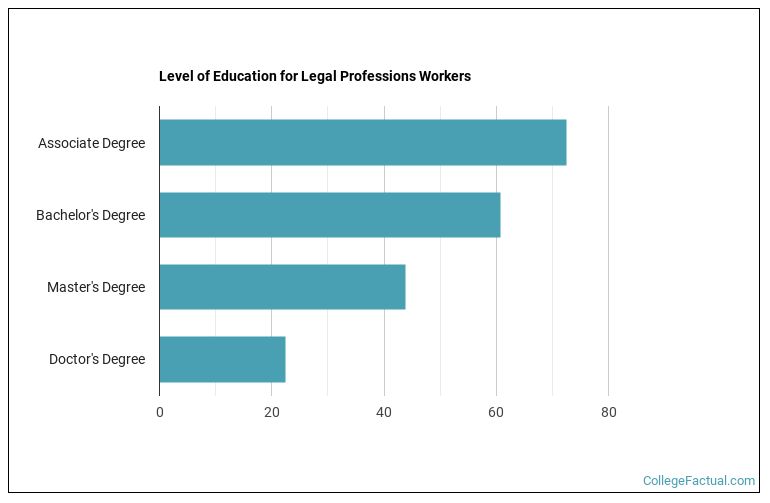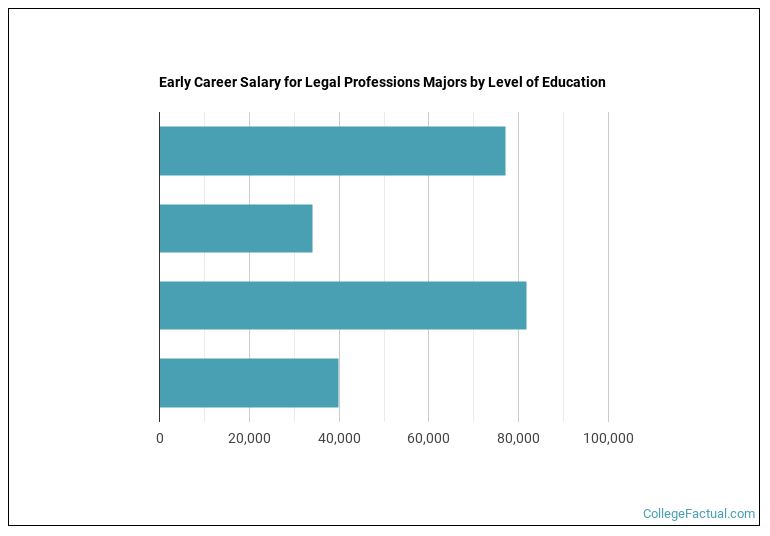 by our College Data Analytics Team
by our College Data Analytics TeamDoes the idea of defending a citizen in a criminal court make you excited? How about researching laws and regulations to help people start a business, create public policy or defend themselves from illegal actions? All lawyer jokes aside, Lawyers and Legal Professionals offer critical services to every day Americans.
Choosing a major in the field of Legal Professionals will allow you to study many different disciplines and use that knowledge to understand and analyze law and public policy. As you further your education, you will develop your own attitude and opinions towards law and the justice system through critical investigation. You will learn to explore various concepts through a prism of different perspectives.
Students who major in General Legal Studies frequently go to law school and become layers. However, if you are more interested in behind the scenes work you might consider majoring in or Legal Support Services. No matter what field you decide to pursue, you will learn fundamental legal concepts as well as current issues. You will take classes exploring the history of law, researching and writing for legal documents, and how to think critically.
In 2021-2022, legal professions was the 16th most popular major nationwide with 67,032 degrees awarded. This year's Best Legal Professions Schools ranking compares 125 of them to identify the best overall programs in the country. Explore this or one of our many other custom legal professions rankings further below.
A driving interest and passion in law and government will get you far in this field. You will be spending hours of time researching laws, debating their effectiveness and coming up with new solutions to problems. Learn to be a good listener so you can gain new ideas from classmates and peers. Your coursework may seem dry at times, but it will allow you to understand court rulings and legal resources.
Students who excel in this field tend to have very strong communication skills. You will need to read and write critically and clearly articulate your ideas. Engaging in discussion and staying current on the issues is also important in this field. Coursework includes a lot of reading, writing and research, so students need good time management and organization skills in order to stay ahead.
Most schools will require you to join and have an active role in the school government. Also, you should obtain an internship that deals with the legal profession either over the summer or during the school year. This will help you pick up real-life skills to prepare you for graduate school or the work force.
New students will need to have completed high school or a GED program and each school will have their own minimum GPA and SAT/ACT test requirements. Specific legal professions careers may require a certain level of degree attainment or additional certifications beyond that.
There are various different levels of legal professions degrees. You can get anything from a in legal professions to the highest legal professions degree, a . The time it takes to complete a legal professions degree varies depending on the program.
| Degree | Credit Requirements | Typical Program Length |
|---|---|---|
| Associate Degree | 60-70 credits | 2 years |
| Bachelor’s Degree | 120 credits | 4 years |
| Master’s Degree | 50-70 credits | 1-3 years |
| Doctorate | Program required coursework including thesis or dissertation | At least 4 years |
A doctor's degree is the most common level of education achieved by those in careers related to legal professions, with approximately 21.0% of workers getting one. See the the most common levels of education for legal professions workers below.
| Level of Education | Percentage of Workers |
|---|---|
| Doctoral Degree | 23.0% |
| First Professional Degree | 18.0% |
| Associate’s Degree (or other 2-year degree) | 12.2% |
| Bachelor’s Degree | 11.3% |
| High School Diploma | 10.2% |
About 60.7% of workers in careers related to legal professions obtain at least bachelor's degrees. The chart below shows what degree level those who work in legal professions have obtained.

This of course varies depending on which legal professions career you choose.
Most people who decide to pursue a legal professional degree will continue on to law school to become a lawyer. However, there are many careers in the legal field. These include legal secretaries, court reporters, and paralegals. You may also choose pursue a career in the political science field or public policy.
Want a job when you graduate with your legal professions degree? Legal Professions careers are expected to grow 5.4% between 2016 and 2026.
The following options are some of the most in-demand careers related to legal professions.
| Occupation Name | Projected Jobs | Expected Growth |
|---|---|---|
| Lawyers | 857,500 | 8.2% |
| Paralegals and Legal Assistants | 327,400 | 14.6% |
| Legal Secretaries | 157,500 | -19.1% |
| Title Examiners, Abstractors, and Searchers | 72,000 | 4.3% |
| Legal Support Workers | 52,800 | 3.7% |
Legal Professions graduates between <nil> reported earning an average of $78,058 in the <nil> timeframe. Earnings can range from as low as $20,330 to as high as $220,853. As you might expect, salaries for legal professions graduates vary depending on the level of education that was acquired.

Salaries for legal professions graduates can vary widely by the occupation you choose as well. The following table shows the top highest paying careers legal professions grads often go into.
| Occupation Name | Median Average Salary |
|---|---|
| Lawyers | $144,230 |
| Law Professors | $130,710 |
| Judges, and Magistrates | $121,130 |
| Administrative Law Judges, Adjudicators, and Hearing Officers | $101,210 |
| Arbitrators, Mediators, and Conciliators | $72,760 |
With over 2,520 different legal professions degree programs to choose from, finding the best fit for you can be a challenge. Fortunately you have come to the right place. We have analyzed all of these schools to come up with hundreds of unbiased legal professions school rankings to help you with this.
| Major | Annual Graduates |
|---|---|
| Law | 36,411 |
| Legal Research | 12,336 |
| Legal Support Services | 11,322 |
| Non-Professional General Legal Studies | 4,592 |
| Legal Professions (Other) | 2,371 |
| Related Major | Annual Graduates |
|---|---|
| Homeland Security, Law Enforcement & Firefighting | 140,205 |